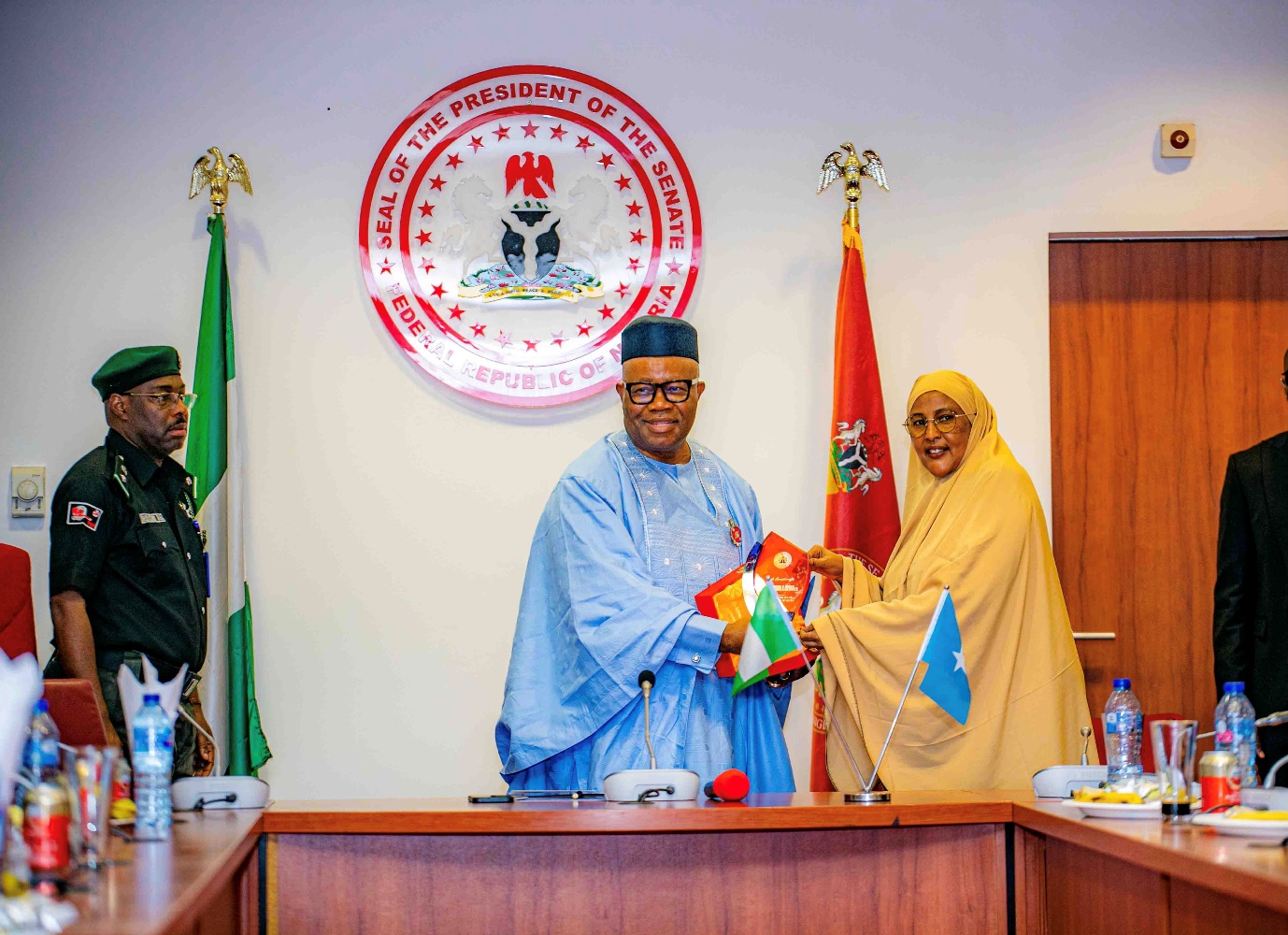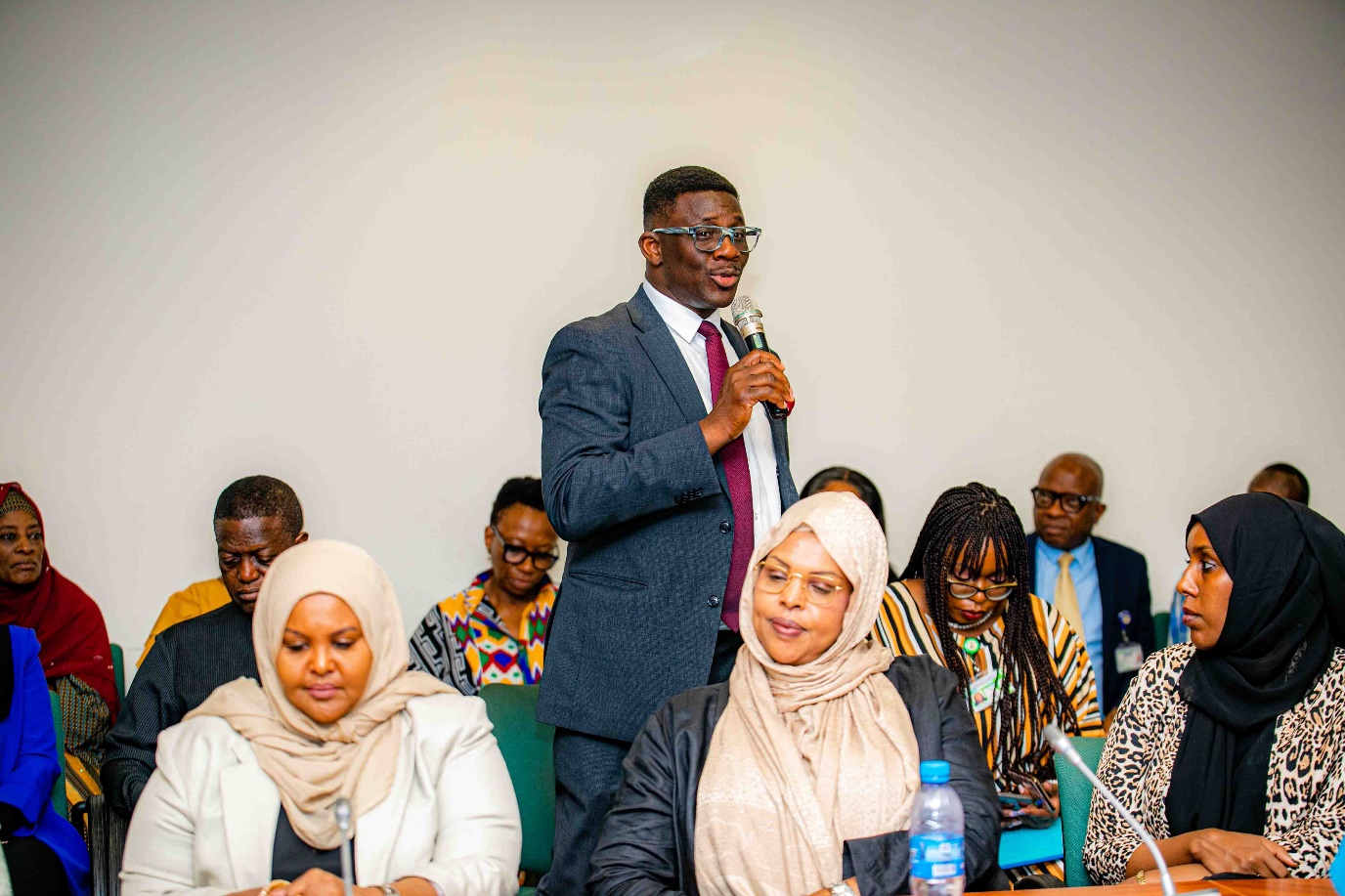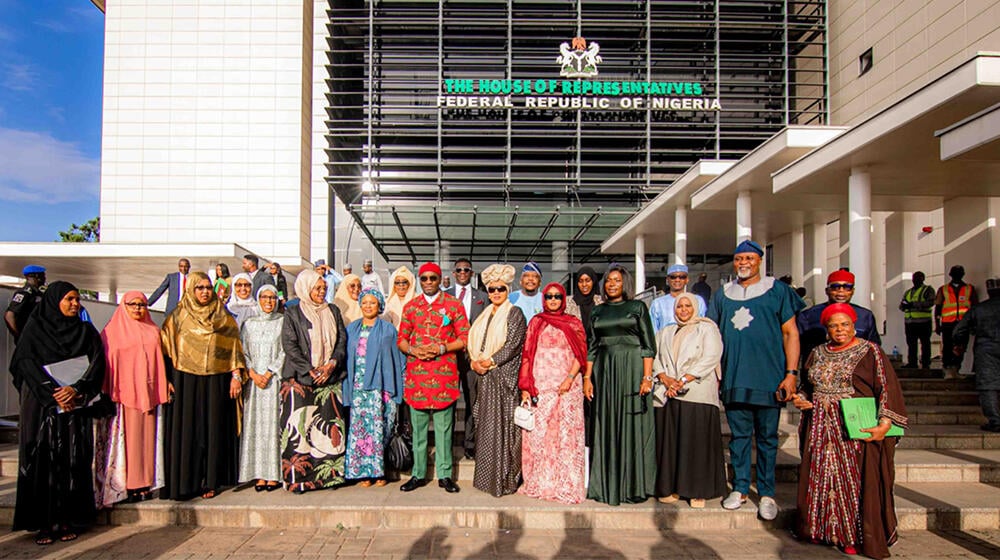Introduction
A delegation of female Somali parliamentarians visited Nigeria from 13-15 November 2023 for a study tour. The visit, facilitated by the United Nations Population Fund(UNFPA) Somalia, encompassed a group of 14 female Members of Parliament, selected from the 54 members of the Somali House of the People and the 14 members of the House of the Senate.
The objective of the visit was to provide an opportunity for the Somali delegates to engage in dialogue and learn from the experience of Nigerian parliamentarians. This would help enhance the Somali MPs’ capacity to initiate and sponsor gender-sensitive legislation, particularly regarding gender-based violence and harmful traditional practices. The study tour consisted of high-level meetings with leaders of the Nigerian Senate and House of Representatives in Abuja, the capital city.
The delegation arrived in Nigeria’s capital Abuja on 13 November 2023. Their first port of call was a meeting with the President of the Nigerian Senate, His Excellency, Godswill Akpabio. Also present were three Nigerian female senators: H.E. Aishatu Dahiru (Senate Committee Chairman on Sustainable Development Goals – SDG), H.E. Ireti Kingibe (Senate Committee Chairman on Women Affairs) and H.E. Natasha Akpoti.
Subsequently, the Somali delegation paid a courtesy visit to the Office of the Speaker in Nigeria's House of Representatives, Tajudden Abbas. The meeting was presided over by the Deputy Speaker, Honourable Benjamin Ikpeazu Kalu, who was representing the Speaker, as the latter was engaged in urgent national matters. Both the Honourable Speaker and the Deputy Speaker are widely respected as highly knowledgeable parliamentarians in Nigeria, having sponsored over 50 bills each over the past four years.
In both meetings, the Nigerian leadership welcomed the delegation and emphasised the importance of parliamentary exchanges between African countries.
Addressing the Senate, Honourable MP - Zamzam Ibrahim Ali, Head of Somalia's House of the People. She thanked the Senate for receiving the delegation and noted Somalia's growing democracy. In her brief remarks, she noted that “Somalia is a growing democracy and our visit is anchored on the hope that it will be an opportunity to exchange knowledge on legislative matters and draw from your experience.”
In response, Senator Ireti Kingibe expressed her gratification at witnessing the delegation's visit to Nigeria. She acknowledged that there is much to be gained from Somalia's experience regarding the inclusion of women in governance, considering the higher percentage (25 percent of female representation) in the Somali parliament. In contrast, the Nigerian Senate and House of Representatives had a only a four percent representation of female senators and House members in each respective chamber.
Furthermore, Senator Kingibe proposed the necessity for a more informal interaction between the delegation and their Nigerian counterparts. She warmly welcomed the delegation to Nigeria and expressed the hope that this visit would be reciprocated. “We welcome you to Nigeria and we hope to reciprocate this visit and come and see how you operate your national assembly.” She said.
“We share the same objectives of ensuring good governance and prosperity.”- President of the Nigerian Senate, His Excellency, Godswill Akpabio
In his address to the delegates, the President of the Nigerian Senate, Akpabio, expressed his satisfaction with the visit, considering it a highly welcome development. He also commended the support provided by the UNFPA in facilitating the study tour. Acknowledging the significance of inter-parliamentary dialogue across Africa, he emphasised that such exchanges are crucial for the shared objectives of promoting good governance and prosperity. The Senate President alsoacknowledged that while Nigeria currently falls behind Somalia in terms of elected women representatives in the National Assembly, the nation remains fully committed to enhancing representation of women in governance, particularly in appointive positions.
Concluding his remarks, the Senate President presented a plaque of appreciation to the head of the Somali delegation. He assured them that their greetings would be conveyed to the President of Nigeria, His Excellency Bola Ahmed Tinubu, who was presently on a visit to Saudi Arabia. He also extended the best wishes of the President and the Federal Republic of Nigeria to the delegation.

The delegation then visited the Office of the Speaker, Nigeria’s House of Representative, Tajudden Abbas However, the meeting was chaired by the Deputy Speaker, Honourable Benjamin Ikpeazu Kalu who represented the Speaker.
Introducing the delegates to the Somali Deputy Speaker, Honourable Dahaba Susow Mohamud conveyed warm regards from the highest authorities in Somalia, including the House Speaker, Adan Muhammad Nur and the Senate Speaker, Abdi Hashi Abdullahi. She expressed gratitude for Nigeria's generosity since their arrival and for the valuable opportunity for dialogue, recognising the shared interests and commonalities between the two nations. She described the visit as a historic occasion and expressed the delegation's eagerness to gain insights into the parliamentary processes as practiced in Nigeria.
Following her introduction, Niyi Ojuolape, the Country Representative of UNFPA-Somalia, briefly elaborated on the objectives of the study tour and the aspirations of the female MPs and UNFPA-Somalia during their visit. He mentioned the ongoing discussions in the Somali parliament regarding a gender-based violence bill and highlighted the importance of learning from the Nigerian experience in advocating for the passage of such legislation.

In response to the Somali delegation, the Nigerian Deputy Speaker expressed his profound satisfaction with the visit, emphasising that the interest shown in transnational dialogue among parliamentarians from different African countries heralds a new era for democracy in Africa.
"I appreciate the mindset in conducting a comparative analysis of parliamentary histories and processes, seeking to understand what works in other parts of the continent, particularly for countries like ours that share similar political experiences and challenges." - Deputy Speaker, Honourable Benjamin Ikpeazu Kalu
The Deputy Speaker further acknowledged that while the Nigerian House of Representatives has a lower number of women MPs compared to Somalia, the women MPs in Nigeria hold a greater number of leadership positions in parliament. He explained, "For instance, 13 out of 16 women MPs chair various committees. These committees serve as specialised mechanisms to address security, humanitarian, and emergency challenges that cannot be easily resolved within existing institutional frameworks.” In light of this, he strongly encouraged the Somali delegation to consider establishing parliamentary committees in Somalia to provide the necessary intervention on legislative matters, extending beyond the traditional oversight functions.
His remarks highlighted the importance of leveraging the expertise and leadership capabilities of women in addressing critical issues and overcoming challenges faced by the nation. By establishing specialised committees, Somalia can enhance its legislative capacity and effectively tackle complex problems in areas such as security and humanitarian crises.
The Deputy Speaker's insightful suggestions underscored the significance of the Somali delegation's visit in fostering the exchange of ideas and best practices between nations. His call for the establishment of parliamentary committees in Somalia demonstrated a commitment to strengthening the legislative process and ensuring that interventions go beyond traditional oversight functions.
Conclusion
The visit provided a platform to advance parliamentary diplomacy through constructive exchanges at top leadership levels. It fulfilled its aim of equipping the Somali delegation with comparative perspectives and lessons that can enrich lawmaking, particularly on empowering women and addressing social issues.
Going forward, institutionalising cooperation through a Nigeria-Somalia Parliamentarians Association, as proposed, could yield ongoing benefits. Areas like shared best practices, capacity building initiatives and high-level dialogues fall within the scope for future collaboration. Formalising the relationship in this manner supports both countries' progressive agendas as developing democracies in Africa.
In conclusion, the study tour facilitated by UNFPA strengthened legislative cooperation and understanding between Somalia and Nigeria. It created opportunities to promote continued learning amongst parliamentarians towards consolidating gender mainstreaming, democracy and good governance across the nations.


